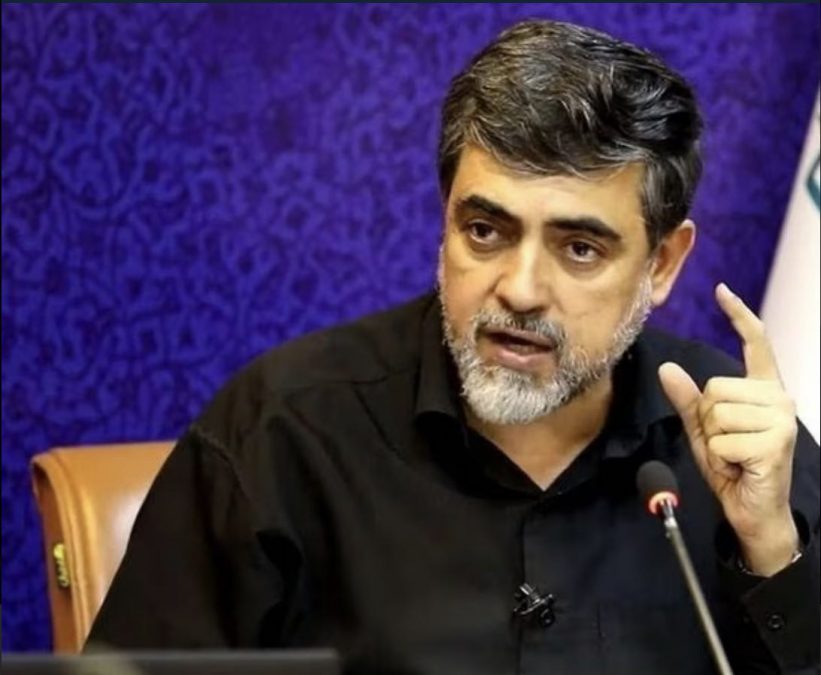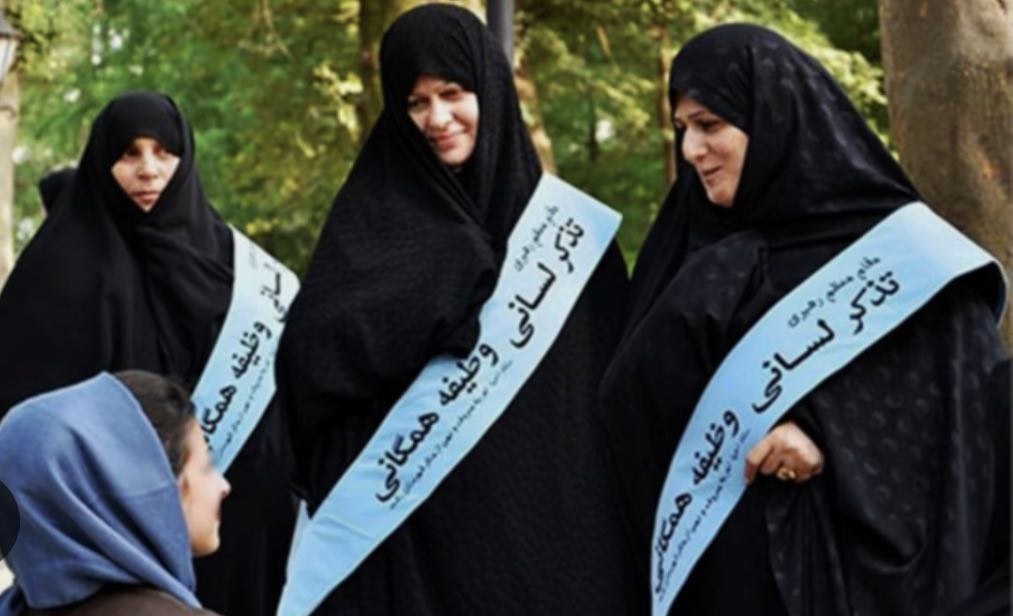The tall defensive wall of the Islamic Republic against the hijab
According to Iran Gate, the head of the judiciary in Iran stated in a recent conference in Isfahan that the unveiling of the hijab is considered an act of enmity towards the system and its values, and those who engage in this deviance will be punished. The unveiling of the hijab is a violation of public decency, religious and legal principles, and the enemy supports it.
This is the latest statement by a senior official of the Islamic Republic regarding the hijab, a subject that has been contentious since September 16, 2022, when Mahsa Amini was announced dead in Kasra Hospital after incidents that occurred in the Ghased-e-Gasht detention center. She had been in a critical condition since two months prior to that, when tensions escalated again in Iran on July 16, the day the video of Sepideh Rashno’s altercation with a veiled woman on a bus was released.
Hashemi Golpayegani at the forefront of defending mandatory hijab

The provocative and unmeasured statements of the Secretary of the Command Headquarters today regarding enjoining good and forbidding evil were such that even if the painful incident of Mahsa Amini at the Guidance Patrol headquarters, the arrest of Sepideh Roshanou, or the video of a mother’s plea to the Guidance Patrol van, or the encounter of a mountain patrol with unveiled girls, or the disclosure of the incident of Guidance Patrol officers shooting at a former national team boxer did not happen, the remarks of Mohammad Saleh Hashemi Golpayegani, the Secretary of the Command Headquarters for Enjoining Good and Forbidding Evil, could ignite chaos in Iran.
Iranian media, three weeks before the death of Mahsa Amini, on September 7th, wrote about Hashemi Golpayegani’s statements, who had repeatedly talked about the 11-point plan for chastity and hijab. They wrote that if someone does not observe hijab in public places like the metro, the metro cameras will take a picture of them and they will be fined a significant amount, and the fine will be posted for them. Nowadays, technology allows images to be matched with the national ID card photo, and unveiled individuals can be identified.
Long before the start of protests over the killing of Mahsa Amini, there were strong voices advocating for stricter enforcement of women’s dress code from various branches of the government. This included shutting down coffee shops and cafes, denying services to women who did not adhere to the hijab, such as banking and government services in certain cities like Mashhad. There were even orders to ban entry to the metro in Mashhad for government employees whose social media accounts showed them without hijab or inappropriately dressed. These issues were widely covered by the media.
The issue is a decree or law.
Beyond all these issues, in mid-1401, Ebrahim Raisi issued an order for the full implementation of the modesty and hijab decree of 1984 in the Supreme Council of the Cultural Revolution. Many legal experts considered this decree illegal. In spring and summer of 1401, there were various decisions and news regarding strict enforcement of the hijab, even until a few weeks after the start of the protests. The Secretary of the Command for Promotion of Virtue and Prevention of Vice also proposed ideas that caused dissent among political groups within the government.
In a news report published by domestic media outlets, including Fars News, on October 9th, Hashemi Golpayegani stated, as reported by the Public Relations Office of the Command of Enjoining Good and Forbidding Evil, that if several million internet taxi drivers are aware that they will be fined for transporting unveiled individuals, more than 50% of the problem of uncovering hijab in vehicles will be resolved. In this case, we will have 4 million enforcers of good and preventers of evil without any tension. This statement led some conservative media outlets to either dismiss Hashemi Golpayegani or for him to remain silent.
However, Hashemi Golpayegani openly expressed his ideas in a manifesto on July 16th, 2022. Some people ask why you are so obsessed with this issue. In response to these, it must be said that if this issue is so simple, why does the enemy take it so seriously and say that if we break down this wall, the rest of the system’s walls will also collapse.
After extensive efforts and advertising campaigns to confront the campaigns against compulsory hijab, it was recently reported by the Young Journalists Club on 21 August 2022 that a new phase has emerged in the virtual space regarding what is referred to as ‘bad hijab’. News about the extent of these crimes has been circulating, but has not been confirmed or denied. It is said that the penalties for not wearing a proper headscarf and veil will be a fine of 300,000 tomans, wearing a short mantoo will be fined 150,000 tomans, wearing a mantoo with an open front will be fined 100,000 tomans, not wearing a mantoo will be fined 500,000 tomans, and wearing heavy makeup will be fined 85,000 tomans.
The dual life of modesty and women’s freedom
Finally, Hashemi Golpayegani gave his consent to remain silent, but in general, the year 2022 was a tense year for the only remaining symbol of Islamic Republic, hijab. However, it seems that nearly six months of nationwide and widespread protests by the people of Iran against hijab with the slogan ‘Women’s Freedom’ has not led to the Islamic Republic abandoning hijab. Instead, it has resulted in a multitude of plans related to promoting hijab and efforts to formulate a law to deal with unveiled women. The fundamental differences between the people of Iran and the established government are still unresolved.
Perhaps one of the most important government initiatives for the hijab is the plan for a modest and ethical lifestyle in the modesty and hijab headquarters, as stated by Mohammad Mehdi Esmaeili, the Minister of Guidance. Another plan is the Cultural Council’s plan for the modesty and hijab headquarters, which was announced by the Minister of Guidance on February 14, 2023. He mentioned that one of our inherent duties in the Public Culture Council is related to issues of clothing and hijab. There, we have sections and tables, such as the fashion and clothing table, the social industries table, and the ethical lifestyle table. Now you can say that it can be called whatever you want, it’s nothing new. Of course, the government’s approach is to have a cultural and social dominance in this area.
However, before this, apparently, the government had a lighter and more ambiguous plan for hijab on December 6, 2022. Hossein Jalali, the representative of Rafsanjan in the Islamic Consultative Assembly, announced to the Maniban news website about the blocking of the bank accounts of unveiled women. The change in approach means that it is possible to inform unveiled individuals through a text message that they have not observed the hijab and should respect the law. After the warning, we enter the stage of notice, then the stage of caution, and in the third stage, it is possible for the bank account of the unveiled individual to be blocked.
There was a scandal, which, despite being denied by the head of the central bank, had certain indications, including the dismissal of a bank branch manager in Qom who had provided banking services to an unveiled woman.
After numerous punitive measures for improper hijab and unveiledness, Ayatollah Ali Khamenei, the Supreme Leader of the Islamic Republic, stated in a meeting with women on January 4, 2023, that proper hijab is a religious obligation and non-negotiable. However, this non-negotiable requirement should not lead to accusing those who do not fully observe hijab of being irreligious or anti-revolutionary. We should not consider someone outside the realm of religion and the revolution just because they have a weak adherence to hijab. We all have shortcomings that we should try to address as much as possible.
It is evident that following these statements, government plans were devised to deal with unveiled women. In the national resolution of the ceremony on February 11, 2023, prepared by the Islamic Propagation Coordination Council, it was stated that respect for hijab laws ensures the psychological and social security of society. Officials should take appropriate measures to prevent the implementation of the enemy’s sinister plans and the tarnishing of the dignity and noble values of Iranian women.
Banking services are prohibited.
Less than two days after the government’s 22 Bahman rally, where Iranian media published images of unveiled and improperly veiled women alongside others, the spokesperson for the Command Headquarters for Promotion of Virtue announced that the national identification cards of improperly veiled women will be frozen. According to Ms. Ali Khanomadi, there is a proposed bill in the parliament that is currently being worked on, which involves freezing the national identification cards in the system and denying services to the individuals for a period of one month.
According to him, today at airports, we see that when a woman without a hijab passes through the gate, she is warned. This plan is similar to that. The confiscation of the national identification card is done after three warnings. This plan is in the parliament and is currently being worked on in specialized committees. Previously, in the monitoring plan for cars, the traffic police commander announced that the discovery of veils in cars has decreased by 81% after sending text messages. At that time, after the third text message, the car would be impounded.
Furthermore, Abdolsamad Khorramabad, the Deputy Attorney General for Supervision over Courts and Judges across the country, wrote in a note published by Iranian media on January 10, 2023, that the police have been ordered by the Attorney General’s Office to decisively deal with the discovery of hijab throughout the country. The main punishment for the crime of unveiling hijab is imprisonment for a period of ten days to two months, according to Article 638 of the Islamic Penal Code enacted in 1996. This comes after a text message regarding the discovery of hijab was sent to vehicle owners again on December 31, 2022.
On the other hand, representatives of the Iranian leader in various cities had strong demands for dealing with unveiled women, and in some cases, there were allegations of corruption in exchange for being veiled. Ahmad Alamolhoda, the Friday prayer leader of Mashhad, encouraged men and women to confront unveiled individuals in his sermons on February 1, 2023. The second sedition is in the realm of hijab, and they have brought the situation to a point where any governing institution that takes action in this regard is perceived as having a governmental hijab. Consequently, the security authority of the system cannot assert its power in this field.
In the issue of hijab, all of you brothers and sisters must stand up and confront the unveiling movement. The statements that have been interpreted as a call for violence against women who do not believe in compulsory hijab are unacceptable. Ayatollah Ahmad Khatami said on February 10, 2023, that it is possible that people may come out against immodesty for a while, but we will not come out and no honorable Iranian Muslim man will allow a woman to walk the streets without proper covering. People must verbally warn and not be indifferent.
On the other hand, Hossein Ali Hajideligani, a member of the parliament, said we should establish a Ministry of Promotion of Virtue. In one of the latest statements, Mehdi Bayati, the secretary of the morality task force, said on March 5, 2023, in Zanjan that public chastity is a matter that we cannot overlook, because our argument is based on our civilizational values and our Iranian culture, and Islam is our second argument. In Surah An-Nur and Surah Al-Ahzab, Allah has made hijab obligatory, and our third argument is based on political, social, and the observance of lawful and unlawful relationships.
In addition to the closure of numerous shopping centers, both large and small, including dental clinics and pharmacies in various cities, even several women have been suspended from the National Library due to immodesty.


